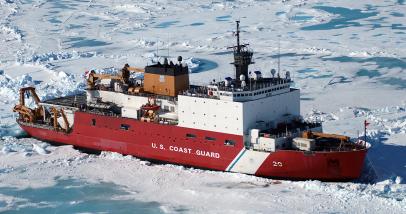America's Arctic Security Strategy

See The Simons Foundation's Disarming Arctic Security page for briefing papers on military policies and practices in the Arctic region by Ernie Regehr, Senior Fellow in Arctic Security at The Simons Foundation.
America's Arctic Security Strategy
May 1, 2015
Few will dispute the observation that the Arctic state least focused on Arctic security is the United States. Alaskan-based forces and arctic submarine patrols obviously figure into US security operations, but their focus is on Asia and America’s strategic nuclear posture, not security conditions in the Arctic. The Arctic is not central to American national mythmaking or identity, to sovereignty concerns, or, since the end of the Cold War, to national security. And none of that is about to change.
The United States obviously conceives of itself as a global power, but not an Arctic power. Not only is the place of the Arctic now much less important in the US security calculous, only a small portion of Arctic geography is American, and the American Arctic is physically, politically, and psychologically far from the centres of US power and economic interests – certainly no American politician would assign the Arctic the role claimed for it by the Russian Deputy Prime Minister, namely “a Russian Mecca.”
A recent EKOS Research survey, undertaken for The Gordon Foundation, polled publics in all eight Arctic states and found that Americans outside Alaska are the least likely to think there is a rising threat of military conflict in the Arctic – while 24 percent felt the threat of military conflict had increased over the past year, in Canada some 30 percent felt tensions had grown, and in Russia it was 50 percent. Americans were in fact the most likely, except for Swedes, among Arctic state populations to declare themselves unaware of any changes in conflict threat levels in the Arctic. Americans outside Alaska were also the least aware of the Arctic Council. Notwithstanding the fact that when the poll was taken the US was preparing to assume the chairmanship of the Council for two years (that term has now begun), only 32 percent of Americans had even heard of it, compared with 70 percent in Iceland and 59 percent in Canada. Continue reading...